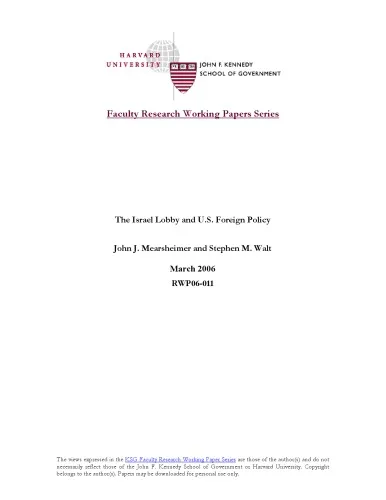Securing Japan: Tokyo's Grand Strategy and the Future of East Asia
4.5
بر اساس نظر کاربران

شما میتونید سوالاتتون در باره کتاب رو از هوش مصنوعیش بعد از ورود بپرسید
هر دانلود یا پرسش از هوش مصنوعی 2 امتیاز لازم دارد، برای بدست آوردن امتیاز رایگان، به صفحه ی راهنمای امتیازات سر بزنید و یک سری کار ارزشمند انجام بدینکتاب های مرتبط:
Securing Japan: Tokyo's Grand Strategy and the Future of East Asia
Unpacking Japan's Geopolitical Position in Evolving East Asian Dynamics
Introduction
In "Securing Japan: Tokyo's Grand Strategy and the Future of East Asia," renowned political scientist Richard J. Samuels delves into the complexities of Japan's national security strategy amid a rapidly evolving geopolitical landscape. Positioned in a region riddled with historical tensions, territorial disputes, and rising powers, Japan's existential challenges are unique yet deeply interconnected with the larger international system. This book provides a nuanced analysis of Japan's past, present, and future attempts to carve a stable and secure niche for itself in Asia while subtly redefining its position on the global stage.
Historically known for its pacifist post-World War II constitution, Japan's approach to security has been deeply constrained and ideologically polarizing within its own political arena. However, shifts in regional power—most notably the rise of China, North Korea's nuclear provocations, and questions surrounding American commitment to Asia—have spurred Tokyo to rethink its security posture. "Securing Japan" chronicles this transformation, demonstrating how policymakers strive to balance domestic discourse, regional stability, and alliances within an increasingly multipolar world.
This book is an essential read for anyone intrigued by the underpinnings of East Asian geopolitics, Japan's delicate diplomatic maneuvering, and the broader implications of its policies on global security. With sharp insights and an accessible narrative, Samuels offers readers more than a history of Japan's strategies; he equips them to interpret contemporary events and anticipate future developments in the region.
Detailed Summary of the Book
"Securing Japan" is structured to provide a comprehensive evaluation of how Japan's grand strategy has evolved in response to external pressures and internal debates. Samuels begins by tracing the post-war constraints imposed by Article 9 of Japan's Constitution, which renounces the right to wage war. This foundation sets the stage for analyzing subsequent debates about Japan's military posture and international role as a "peace-loving nation."
The book then examines pivotal moments, such as the Cold War era, when Japan relied heavily on the U.S.-Japan Security Treaty, through to the post-Cold War period marked by increasing regional competition. Attention is paid to the ongoing challenges posed by North Korea's missile program, China's assertiveness in the East China Sea, and the uncertain reliability of U.S. protection under changing presidencies.
Furthermore, Samuels evaluates Japan's diplomatic and economic strategies, emphasizing the interplay between "normalization" (efforts to reinterpret Article 9) and "hedging" (efforts to avoid provoking regional conflict). He also highlights competing perspectives within Japanese political discourse, dividing them into key schools of thought: those advocating for more assertive military capabilities and those adhering to Japan's post-war pacifist principles.
The final chapters explore Japan's proactive efforts in multilateral diplomacy, economic leverage, and soft power. Through this lens, Samuels draws connections between historical patterns and Japan's current strategic priorities, underscoring how Tokyo's choices will shape the regional and global balance in the years to come.
Key Takeaways
- Japan's grand strategy is deeply rooted in the collective memory of its wartime past and its pacifist post-war constitution.
- Rising regional threats like North Korea and China's growing influence are pushing Japan to incrementally redefine its security policy.
- The U.S.-Japan alliance remains critical, but doubts about U.S. consistency have motivated Japan to explore greater self-reliance and diversification in partnerships.
- Japan's strategy reveals a delicate balance between maintaining an emphasis on peace and adapting to the realities of a competitive strategic environment.
- Domestic debates between "normalizers" and "pacifists" significantly influence the evolution of Japan’s policies, creating a unique duality in its grand strategy.
Famous Quotes from the Book
"National security is as much about identity as it is about borders, and Japan must reconcile its sense of self with its place in the region."
"The rise of China is not just a shift in power; it’s a reordering of Japan’s longstanding assumptions about its own relevance."
"Grand strategy in Japan is a contest between pragmatism and idealism, a tug-of-war that shapes every policy decision."
Why This Book Matters
"Securing Japan" is a crucial contribution to the field of international relations and East Asian studies. By meticulously unraveling the multi-dimensional aspects of Japan’s security strategy, Samuels enables readers to appreciate the complexity of this critical force in global politics. His work stands out for its balanced perspective, neither vilifying Japan’s rise to more proactive security measures nor championing it uncritically.
In an era marked by geopolitical uncertainty, understanding the choices of nations like Japan is more important than ever. As a major player in both regional and global realms, Japan's strategic decisions influence the stability of the entire East Asian region, the future of U.S.-Asia relations, and the direction of international norms regarding peace, security, and cooperation.
Whether you are a foreign policy expert, a student of Asian geopolitics, or simply a curious reader, "Securing Japan" offers invaluable insights into the delicate art of statecraft and the intricate balance between peace and security in an age of change.
دانلود رایگان مستقیم
شما میتونید سوالاتتون در باره کتاب رو از هوش مصنوعیش بعد از ورود بپرسید
دسترسی به کتابها از طریق پلتفرمهای قانونی و کتابخانههای عمومی نه تنها از حقوق نویسندگان و ناشران حمایت میکند، بلکه به پایداری فرهنگ کتابخوانی نیز کمک میرساند. پیش از دانلود، لحظهای به بررسی این گزینهها فکر کنید.
این کتاب رو در پلتفرم های دیگه ببینید
WorldCat به شما کمک میکنه تا کتاب ها رو در کتابخانه های سراسر دنیا پیدا کنید
امتیازها، نظرات تخصصی و صحبت ها درباره کتاب را در Goodreads ببینید
کتابهای کمیاب یا دست دوم را در AbeBooks پیدا کنید و بخرید
1381
بازدید4.5
امتیاز0
نظر98%
رضایتنظرات:
4.5
بر اساس 0 نظر کاربران
Questions & Answers
Ask questions about this book or help others by answering
No questions yet. Be the first to ask!














